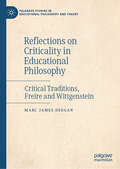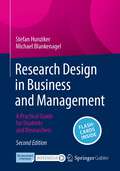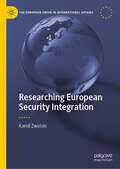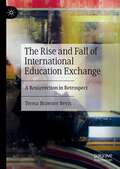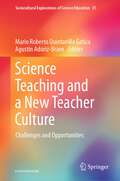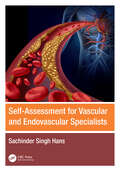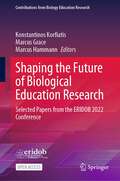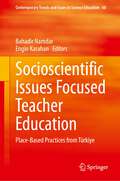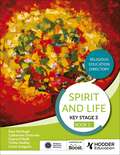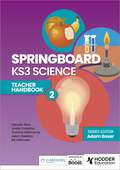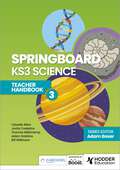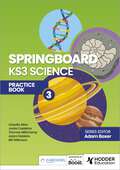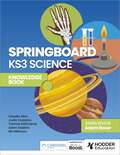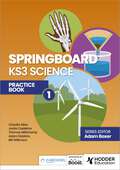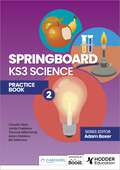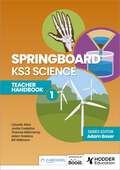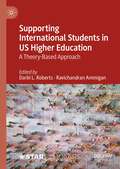- Table View
- List View
Reflections on Criticality in Educational Philosophy: Critical Traditions, Freire and Wittgenstein (Palgrave Studies in Educational Philosophy and Theory)
by Marc James DeeganThis book navigates global educational policy concerning critical thinking skills and competencies. The author explores the concept of criticality from the perspectives of several critical traditions, and draws on the works of Paulo Freire and Ludwig Wittgenstein. The diverse and intricate ideas, methods and ways of thinking that emerge are examined in the new perspectival space of ‘criticality scholarship’. Pursuing his own political and philosophical aspirations, the author endeavours to link a critical education with the promotion of democracy and social justice. Opportunities for further empirical and theoretical research are signposted. The book will be of interest to scholars in educational philosophy.
Research Design in Business and Management: A Practical Guide for Students and Researchers
by Stefan Hunziker Michael BlankenagelThis textbook on research designs provides undergraduate and graduate students with detailed guidance to tackle their research projects. It has been recommended and developed for university courses in Germany, Austria, and Switzerland. The authors offer students relevant research designs in business and management. They show how to overcome the common qualitative and quantitative methods divide. For this purpose, the textbook focuses on the scientific problem-solving process. It emphasizes the importance of an appropriate research design to produce intellectual contributions. The authors describe the most relevant research designs in business and management research. They assess each research design about its suitability to answer specific research questions. The textbook also covers academic writing and provides valuable tips about the whole research process. It not only serves students as a resource to conduct their research projects. Moreover, it is also a helpful reference throughout the entire academic career.
Researching European Security Integration (The European Union in International Affairs)
by Kamil ZwolskiThis book provides new and established researchers with innovative methodologies and research strategies to explore European security integration from a different perspective, challenging traditional theoretical interpretations. It takes a step back from well-established theoretical approaches to the European Union’s (EU) Common Foreign and Security Policy (CFSP) and Common Security and Defence Policy (CSDP) to ask more fundamental questions about the core assumptions underpinning research on European security integration. It supports methodological innovations with an analysis of the most significant empirical problems of European security governance, including the war in Ukraine or the role of Russia in European security. In the last chapter, the author offers ideas for new pedagogical approaches to teaching European Studies.
The Rise and Fall of International Education Exchange: A Resurrection in Retrospect
by Teresa Brawner BevisThis book tells the story of America’s legendary rise in the field of international education exchange, its recent stumble during the pandemic era, and its current resurrection. America brings to its shores more foreign students than any other country, and their presence is the most critical indicator of its exceptional quality of scholarship. Achieving this level of distinction has required public, private, and civic organizations, in league with generations of inspired individuals. Recently there were indications of a fall, mostly attributed to the pandemic, but also to a host of volatile social and geopolitical issues. Unchanged, however, have been the overarching goals of intercultural understanding and world peace. As the field resurrects, some worry that deeper degeneration may still be looming. Others foresee a bright future and predict an aggressive new rise in the field of international education exchange.
Science Teaching and a New Teacher Culture: Challenges and Opportunities (Sociocultural Explorations of Science Education #31)
by Mario Roberto Quintanilla Gatica Agustín Adúriz-BravoThis edited volume discusses various epistemological positions about science teaching and the complex processes of understanding and learning in the classroom. Including discussions around Natural Sciences teacher training models, as well as the development of logics of reflection on practice based on critical and dialogic interpretative visions guiding higher level competency learning. It brings together contributions from researchers promoting a coherent and robust methodological analysis, theoretically based on the systematization of evidence in different contexts within Europe and Latin America.While supporting innovation in teacher training and science teaching, it offers specific contributions and suggestions for classroom work in the subjects of Physics, Chemistry and Biology. It includes didactic guidelines for experimental practices, for the evaluation of scientific learning, as well as for the use of epistemology and the history of science in teaching. In addition, it’s considered an important contribution to the challenge of rebuilding science education programs as well as its correct implementation in schools and universities. This book is a translation of an original Spanish publication. The translation was done with the help of artificial intelligence (machine translation by the service DeepL.com). A subsequent human revision was done primarily in terms of content, so that the book will read stylistically differently from a conventional translation.
Self-Assessment for Vascular and Endovascular Specialists
by Sachinder HansIncluding over 500 multiple choice questions covering a wide range of vascular disorders to test the skills of all vascular specialists. Suitable for postgraduate trainee vascular medicine internists, interventional radiologists, vascular surgeons, and endovascular therapists as they prepare for exams or ensure that they remain up to date. Divided into 21 subject specific-sections and meticulously written and researched, the questions and their accompanying rationales are enhanced by explanatory illustrations and supported by key references. Students and experienced clinicians will be prepared for both testing and teaching in all aspects of clinical practice. Advances in the treatment of vascular disease have played a significant role in rising life expectancy over the past 70 years, resulting in lower morbidity, mortality, and quicker recoveries. However, there remains an urgent challenge in controlling risk factors such as obesity, sedentary lifestyles, and tobacco abuse. As explosive growth in endovascular technology continues, it is more important than ever for vascular specialists to remain proficient and stay up to date.
Shaping the Future of Biological Education Research: Selected Papers from the ERIDOB 2022 Conference (Contributions from Biology Education Research)
by Konstantinos Korfiatis Marcus Grace Marcus HammannThis open access volume is a collection of full papers based on the peer-reviewed presentations accepted for the European Researchers in Didactics of Biology, ERIDOB 2022 conference. ERIDOB aims to bring together researchers in didactics of Biology from Europe and around the world to share and discuss their research work and results. It is the only major international conference whose focus lies exclusively on biology education research, and all the papers are written by international researchers from across Europe (and beyond) which report on a range of contemporary biology education research projects. They are all entirely new papers describing new research in the field. Each paper has been peer-reviewed by experienced biology education researchers and the members of the ERIDOB Academic Committee. The selected papers are collated within the following categories of biology education: · Teaching Strategies and Learning Environments · Students’ Knowledge, Conceptions, Values, Attitudes and Motivation · Outdoor and Environmental Education · Biology Teachers’ Professional Development By providing a collection of new research findings from many countries, this book is a great resource for researchers and practitioners such as school, college and university biology teachers' around the world. It is useful for training biology teachers and therefore valuable to teacher training institutions.
Socioscientific Issues Focused Teacher Education: Place-Based Practices from Türkiye (Contemporary Trends and Issues in Science Education #60)
by Bahadir Namdar Engin KarahanThis book explores place-based pedagogies in the context of socioscientific issues in Türkiye. From local and global contexts, it delves into research-based learning activities for science teacher educators, offering insights to educators worldwide.The book aims to empower teachers to provide students with learning experiences centered on local socioscientific issues essential for developing scientifically literate citizens. Each chapter showcases effective practices, focusing on local topics like gold mining, nuclear power plants, and river pollution. By incorporating socioscientific elements into science lessons, teachers are encouraged to foster students’ responsibility values, argumentation, critical thinking, and awareness. Emphasizing the crucial components of place-basedness and relevancy of SSI learning environments, students are guided towards more sophisticated ways of conceptualizing and resolving SSI. The intended audience includes science teacher educators, researchers, and educators devoted to engaging students in meaningful socioscientific learning experiences.
Spirit and Life: Religious Education Directory for Catholic Schools Key Stage 3 Book 2
by Paul McHugh Trisha Hedley Claire O'Neill Carol GregsonThis title has received an Imprimatur and has been endorsed by the Catholic Education Service for the new REDEncourage students to engage with Catholic Religious Education at Key Stage 3 and enable them to understand, discern and respond to key concepts and ideas.This accessible Student Book has been written by experienced teachers and diocesan advisors to support the new Religious Education Directory (RED). - Easily deliver engaging lessons with in-depth content and ready-made tasks for each branch of learning within the new curriculum- Teach with confidence, whatever your level of expertise, with comprehensive and reliable guidance to support both specialists and non-specialists- Build students' knowledge with clear content coverage, including topic overviews, annotated extracts from scripture and clear explanations of key terms- Deepen understanding and help students to engage critically with the content by working through the 'Understand', 'Discern' and 'Respond' tasks throughout - Consolidate previous learning with links between topics highlighted to encourage students to revisit and recap what they have already covered
Spirit and Life: Religious Education Directory for Catholic Schools Key Stage 3 Book 2
by Paul McHugh Trisha Hedley Claire O'Neill Carol GregsonThis title has received an Imprimatur and has been endorsed by the Catholic Education Service for the new REDEncourage students to engage with Catholic Religious Education at Key Stage 3 and enable them to understand, discern and respond to key concepts and ideas.This accessible Student Book has been written by experienced teachers and diocesan advisors to support the new Religious Education Directory (RED). - Easily deliver engaging lessons with in-depth content and ready-made tasks for each branch of learning within the new curriculum- Teach with confidence, whatever your level of expertise, with comprehensive and reliable guidance to support both specialists and non-specialists- Build students' knowledge with clear content coverage, including topic overviews, annotated extracts from scripture and clear explanations of key terms- Deepen understanding and help students to engage critically with the content by working through the 'Understand', 'Discern' and 'Respond' tasks throughout - Consolidate previous learning with links between topics highlighted to encourage students to revisit and recap what they have already covered
Springboard: Teacher Handbook 2
by Adam Boxer Adam Robbins Claudia Allan Jovita Castelino Thomas Millichamp Bill WilkinsonDeliver the Springboard Science course confidently with this workload-friendly approach to a knowledge-rich curriculum.Learn how to use cognitive science principles to deliver more effective, dynamic and engaging lessons, whatever your level of experience. Divided into topics, rather than lessons, this handbook enables you to teach each topic in a responsive fashion and at a pace that is right for your students.> Feel fully supported. Guided explanations, diagram constructions, demonstrations and worked examples have been carefully crafted to support all teachers, including those teaching outside of their subject specialism. > Overcome common misconceptions. Prerequisite knowledge checks for students help you to identify any missing knowledge or misconceptions before a topic is started, with approaches to solve these covered throughout the explanations.> Tailor teaching to the class in front of you. 'Check for understanding' questions allow you to adapt your delivery to meet students' needs, with suggested questions and responses to start the process. > Take a different approach to practicals. Our 'slow practical' approach exemplifies core concepts and provides students with a clear grounding in practical skills, with at least one essential practical for every unit.
Springboard: Teacher Handbook 2
by Adam Boxer Adam Robbins Claudia Allan Jovita Castelino Thomas Millichamp Bill WilkinsonDeliver the Springboard Science course confidently with this workload-friendly approach to a knowledge-rich curriculum.Learn how to use cognitive science principles to deliver more effective, dynamic and engaging lessons, whatever your level of experience. Divided into topics, rather than lessons, this handbook enables you to teach each topic in a responsive fashion and at a pace that is right for your students.> Feel fully supported. Guided explanations, diagram constructions, demonstrations and worked examples have been carefully crafted to support all teachers, including those teaching outside of their subject specialism. > Overcome common misconceptions. Prerequisite knowledge checks for students help you to identify any missing knowledge or misconceptions before a topic is started, with approaches to solve these covered throughout the explanations.> Tailor teaching to the class in front of you. 'Check for understanding' questions allow you to adapt your delivery to meet students' needs, with suggested questions and responses to start the process. > Take a different approach to practicals. Our 'slow practical' approach exemplifies core concepts and provides students with a clear grounding in practical skills, with at least one essential practical for every unit.
Springboard: Ks3 Science Teacher Handbook 3
by Adam Boxer Adam Robbins Claudia Allan Jovita Castelino Thomas Millichamp Bill WilkinsonDeliver the Springboard Science course confidently with this workload-friendly approach to a knowledge-rich curriculum.Learn how to use cognitive science principles to deliver more effective, dynamic and engaging lessons, whatever your level of experience. Divided into topics, rather than lessons, this handbook enables you to teach each topic in a responsive fashion and at a pace that is right for your students.> Feel fully supported. Guided explanations, diagram constructions, demonstrations and worked examples have been carefully crafted to support all teachers, including those teaching outside of their subject specialism. > Overcome common misconceptions. Prerequisite knowledge checks for students help you to identify any missing knowledge or misconceptions before a topic is started, with approaches to solve these covered throughout the explanations.> Tailor teaching to the class in front of you. 'Check for understanding' questions allow you to adapt your delivery to meet students' needs, with suggested questions and responses to start the process. > Take a different approach to practicals. Our 'slow practical' approach exemplifies core concepts and provides students with a clear grounding in practical skills, with at least one essential practical for every unit.
Springboard: Ks3 Science Practice Book
by Adam Boxer Jovita Castelino Claudia Allan Adam Robbins Thomas Millichamp Bill WilkinsonProvide all the independent practice needed for your Springboard Science course with over 1000 questions in each Practice Book.Designed to be used alongside our Knowledge Book, our Practice Books provide shed loads of practice (SLOP) for students to consolidate, apply and extend the knowledge that they have learnt.With decades of teaching experience and extensive knowledge of applying cognitive science in the classroom, you can trust our author team to have created carefully crafted and varied questions for independent practice.> Improve students' long-term retention. Spacing is built in throughout this Practice Book, improving retention over time.> Highlight connections between topics and Sciences. Interleaving of content encourages students to recognise and focus on the connections, similarities and differences across science, enabling them to reflect on their learning in more depth.> Build confidence in the key skills. Question sets include coverage of the key mathematical and working scientifically skills that students need to understand, ensuring that this knowledge is embedded throughout their independent practice.> Support every student. Links to the relevant worked examples in the Knowledge Book are highlighted throughout each unit for easy reference.> Prepare for the next step. Questions increase in difficulty throughout each topic, enabling students to progress through the KS3 curriculum and prepare for KS4 and beyond. Answers are available online for free, and also embedded into the lesson presentations in our Boost digital teaching and learning resources for easy in-class independent practice review.
Springboard: Ks3 Science Teacher Handbook 3
by Adam Boxer Adam Robbins Claudia Allan Jovita Castelino Thomas Millichamp Bill WilkinsonDeliver the Springboard Science course confidently with this workload-friendly approach to a knowledge-rich curriculum.Learn how to use cognitive science principles to deliver more effective, dynamic and engaging lessons, whatever your level of experience. Divided into topics, rather than lessons, this handbook enables you to teach each topic in a responsive fashion and at a pace that is right for your students.> Feel fully supported. Guided explanations, diagram constructions, demonstrations and worked examples have been carefully crafted to support all teachers, including those teaching outside of their subject specialism. > Overcome common misconceptions. Prerequisite knowledge checks for students help you to identify any missing knowledge or misconceptions before a topic is started, with approaches to solve these covered throughout the explanations.> Tailor teaching to the class in front of you. 'Check for understanding' questions allow you to adapt your delivery to meet students' needs, with suggested questions and responses to start the process. > Take a different approach to practicals. Our 'slow practical' approach exemplifies core concepts and provides students with a clear grounding in practical skills, with at least one essential practical for every unit.
Springboard: Ks3 Science Practice Book
by Adam Boxer Jovita Castelino Claudia Allan Adam Robbins Thomas Millichamp Bill WilkinsonProvide all the independent practice needed for your Springboard Science course with over 1000 questions in each Practice Book.Designed to be used alongside our Knowledge Book, our Practice Books provide shed loads of practice (SLOP) for students to consolidate, apply and extend the knowledge that they have learnt.With decades of teaching experience and extensive knowledge of applying cognitive science in the classroom, you can trust our author team to have created carefully crafted and varied questions for independent practice.> Improve students' long-term retention. Spacing is built in throughout this Practice Book, improving retention over time.> Highlight connections between topics and Sciences. Interleaving of content encourages students to recognise and focus on the connections, similarities and differences across science, enabling them to reflect on their learning in more depth.> Build confidence in the key skills. Question sets include coverage of the key mathematical and working scientifically skills that students need to understand, ensuring that this knowledge is embedded throughout their independent practice.> Support every student. Links to the relevant worked examples in the Knowledge Book are highlighted throughout each unit for easy reference.> Prepare for the next step. Questions increase in difficulty throughout each topic, enabling students to progress through the KS3 curriculum and prepare for KS4 and beyond. Answers are available online for free, and also embedded into the lesson presentations in our Boost digital teaching and learning resources for easy in-class independent practice review.
Springboard: KS3 Science Knowledge Book
by Adam Robbins Claudia Allan Jovita Castelino Thomas Millichamp Bill WilkinsonCover all the knowledge that students need to know for Key Stage 3 Science in one book.Powered by cognitive science principles, this knowledge-rich book enables students to keep revisiting content, see the links between the sciences, and develop deeper understanding.Our expert author team have used their extensive experience of research-informed teaching practice to create this carefully thought-out Knowledge Book. It will establish and embed the key scientific knowledge and skills that students need to succeed at KS3, ensuring they feel enthused and confident about progressing to GCSE. > Take a new approach to KS3 Science. This Knowledge Book sequences the National Curriculum with unprecedented precision, enabling students to progress through KS3 with ease and fluency.> Reduce cognitive load. Every topic is explained through a succinct and focused table of questions and answers, which captures all the essential knowledge that pupils need.> Use visual aids to further understanding. Complex topics are paired with annotated diagrams, and worked examples are provided to illustrate key skills and calculations in further detail.> Strengthen scientific skills throughout. 'Working Scientifically' pages integrate principles and concepts into students' understanding, using questions and answers, diagrams, tables and more.
Springboard: KS3 Science Knowledge Book
by Adam Robbins Claudia Allan Jovita Castelino Thomas Millichamp Bill WilkinsonCover all the knowledge that students need to know for Key Stage 3 Science in one book.Powered by cognitive science principles, this knowledge-rich book enables students to keep revisiting content, see the links between the sciences, and develop deeper understanding.Our expert author team have used their extensive experience of research-informed teaching practice to create this carefully thought-out Knowledge Book. It will establish and embed the key scientific knowledge and skills that students need to succeed at KS3, ensuring they feel enthused and confident about progressing to GCSE. > Take a new approach to KS3 Science. This Knowledge Book sequences the National Curriculum with unprecedented precision, enabling students to progress through KS3 with ease and fluency.> Reduce cognitive load. Every topic is explained through a succinct and focused table of questions and answers, which captures all the essential knowledge that pupils need.> Use visual aids to further understanding. Complex topics are paired with annotated diagrams, and worked examples are provided to illustrate key skills and calculations in further detail.> Strengthen scientific skills throughout. 'Working Scientifically' pages integrate principles and concepts into students' understanding, using questions and answers, diagrams, tables and more.
Springboard: KS3 Science Practice Book 1
by Adam Boxer Jovita Castelino Claudia Allan Adam Robbins Thomas Millichamp Bill WilkinsonProvide all the independent practice needed for your Springboard Science course with over 1000 questions in each Practice Book.Designed to be used alongside our Knowledge Book, our Practice Books provide shed loads of practice (SLOP) for students to consolidate, apply and extend the knowledge that they have learnt.With decades of teaching experience and extensive knowledge of applying cognitive science in the classroom, you can trust our author team to have created carefully crafted and varied questions for independent practice.> Improve students' long-term retention. Spacing is built in throughout this Practice Book, improving retention over time.> Highlight connections between topics and Sciences. Interleaving of content encourages students to recognise and focus on the connections, similarities and differences across science, enabling them to reflect on their learning in more depth.> Build confidence in the key skills. Question sets include coverage of the key mathematical and working scientifically skills that students need to understand, ensuring that this knowledge is embedded throughout their independent practice.> Support every student. Links to the relevant worked examples in the Knowledge Book are highlighted throughout each unit for easy reference.> Prepare for the next step. Questions increase in difficulty throughout each topic, enabling students to progress through the KS3 curriculum and prepare for KS4 and beyond. Answers are available online for free, and also embedded into the lesson presentations in our Boost digital teaching and learning resources for easy in-class independent practice review.
Springboard: KS3 Science Practice Book 1
by Adam Boxer Jovita Castelino Claudia Allan Adam Robbins Thomas Millichamp Bill WilkinsonProvide all the independent practice needed for your Springboard Science course with over 1000 questions in each Practice Book.Designed to be used alongside our Knowledge Book, our Practice Books provide shed loads of practice (SLOP) for students to consolidate, apply and extend the knowledge that they have learnt.With decades of teaching experience and extensive knowledge of applying cognitive science in the classroom, you can trust our author team to have created carefully crafted and varied questions for independent practice.> Improve students' long-term retention. Spacing is built in throughout this Practice Book, improving retention over time.> Highlight connections between topics and Sciences. Interleaving of content encourages students to recognise and focus on the connections, similarities and differences across science, enabling them to reflect on their learning in more depth.> Build confidence in the key skills. Question sets include coverage of the key mathematical and working scientifically skills that students need to understand, ensuring that this knowledge is embedded throughout their independent practice.> Support every student. Links to the relevant worked examples in the Knowledge Book are highlighted throughout each unit for easy reference.> Prepare for the next step. Questions increase in difficulty throughout each topic, enabling students to progress through the KS3 curriculum and prepare for KS4 and beyond. Answers are available online for free, and also embedded into the lesson presentations in our Boost digital teaching and learning resources for easy in-class independent practice review.
Springboard: KS3 Science Practice Book 2
by Adam Boxer Jovita Castelino Claudia Allan Adam Robbins Thomas Millichamp Bill WilkinsonProvide all the independent practice needed for your Springboard Science course with over 1000 questions in each Practice Book.Designed to be used alongside our Knowledge Book, our Practice Books provide shed loads of practice (SLOP) for students to consolidate, apply and extend the knowledge that they have learnt.With decades of teaching experience and extensive knowledge of applying cognitive science in the classroom, you can trust our author team to have created carefully crafted and varied questions for independent practice.> Improve students' long-term retention. Spacing is built in throughout this Practice Book, improving retention over time.> Highlight connections between topics and Sciences. Interleaving of content encourages students to recognise and focus on the connections, similarities and differences across science, enabling them to reflect on their learning in more depth.> Build confidence in the key skills. Question sets include coverage of the key mathematical and working scientifically skills that students need to understand, ensuring that this knowledge is embedded throughout their independent practice.> Support every student. Links to the relevant worked examples in the Knowledge Book are highlighted throughout each unit for easy reference.> Prepare for the next step. Questions increase in difficulty throughout each topic, enabling students to progress through the KS3 curriculum and prepare for KS4 and beyond. Answers are available online for free, and also embedded into the lesson presentations in our Boost digital teaching and learning resources for easy in-class independent practice review.
Springboard: KS3 Science Practice Book 2
by Adam Boxer Jovita Castelino Claudia Allan Adam Robbins Thomas Millichamp Bill WilkinsonProvide all the independent practice needed for your Springboard Science course with over 1000 questions in each Practice Book.Designed to be used alongside our Knowledge Book, our Practice Books provide shed loads of practice (SLOP) for students to consolidate, apply and extend the knowledge that they have learnt.With decades of teaching experience and extensive knowledge of applying cognitive science in the classroom, you can trust our author team to have created carefully crafted and varied questions for independent practice.> Improve students' long-term retention. Spacing is built in throughout this Practice Book, improving retention over time.> Highlight connections between topics and Sciences. Interleaving of content encourages students to recognise and focus on the connections, similarities and differences across science, enabling them to reflect on their learning in more depth.> Build confidence in the key skills. Question sets include coverage of the key mathematical and working scientifically skills that students need to understand, ensuring that this knowledge is embedded throughout their independent practice.> Support every student. Links to the relevant worked examples in the Knowledge Book are highlighted throughout each unit for easy reference.> Prepare for the next step. Questions increase in difficulty throughout each topic, enabling students to progress through the KS3 curriculum and prepare for KS4 and beyond. Answers are available online for free, and also embedded into the lesson presentations in our Boost digital teaching and learning resources for easy in-class independent practice review.
Springboard: KS3 Science Teacher Handbook 1
by Adam Boxer Adam Robbins Claudia Allan Jovita Castelino Thomas Millichamp Bill WilkinsonDeliver the Springboard Science course confidently with this workload-friendly approach to a knowledge-rich curriculum.Learn how to use cognitive science principles to deliver more effective, dynamic and engaging lessons, whatever your level of experience. Divided into topics, rather than lessons, this handbook enables you to teach each topic in a responsive fashion and at a pace that is right for your students.> Feel fully supported. Guided explanations, diagram constructions, demonstrations and worked examples have been carefully crafted to support all teachers, including those teaching outside of their subject specialism. > Overcome common misconceptions. Prerequisite knowledge checks for students help you to identify any missing knowledge or misconceptions before a topic is started, with approaches to solve these covered throughout the explanations.> Tailor teaching to the class in front of you. 'Check for understanding' questions allow you to adapt your delivery to meet students' needs, with suggested questions and responses to start the process. > Take a different approach to practicals. Our 'slow practical' approach exemplifies core concepts and provides students with a clear grounding in practical skills, with at least one essential practical for every unit.
Springboard: KS3 Science Teacher Handbook 1
by Adam Boxer Adam Robbins Claudia Allan Jovita Castelino Thomas Millichamp Bill WilkinsonDeliver the Springboard Science course confidently with this workload-friendly approach to a knowledge-rich curriculum.Learn how to use cognitive science principles to deliver more effective, dynamic and engaging lessons, whatever your level of experience. Divided into topics, rather than lessons, this handbook enables you to teach each topic in a responsive fashion and at a pace that is right for your students.> Feel fully supported. Guided explanations, diagram constructions, demonstrations and worked examples have been carefully crafted to support all teachers, including those teaching outside of their subject specialism. > Overcome common misconceptions. Prerequisite knowledge checks for students help you to identify any missing knowledge or misconceptions before a topic is started, with approaches to solve these covered throughout the explanations.> Tailor teaching to the class in front of you. 'Check for understanding' questions allow you to adapt your delivery to meet students' needs, with suggested questions and responses to start the process. > Take a different approach to practicals. Our 'slow practical' approach exemplifies core concepts and provides students with a clear grounding in practical skills, with at least one essential practical for every unit.
Supporting International Students in US Higher Education: A Theory-Based Approach
by Darbi L. Roberts Ravichandran AmmiganThis book explores the integral role that student affairs professionals play in the success of international students at higher education institutions in the US. International student support has often been thought of as the principal responsibility of international student services offices, but research suggests that international student engagement in the broader university community, and support for them by all student affairs and services offices on campus, is closely tied to persistence and retention. The authors explore a student development theory-based approach to supporting the experience and success of international students from all facets of student affairs and services. The book explores practical and strategic implications of a more integrative approach to international student support both inside and outside of the classroom, while also utilizing a critical lens in applying models that were originally built for predominantly white institutions and US citizens.
